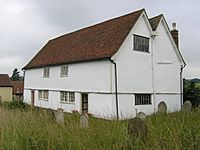Walpole Old Chapel facts for kids
Quick facts for kids Walpole Old Chapel |
|
|---|---|

Walpole Old Chapel
|
|
| Location | Halesworth Road, Walpole, Suffolk, England |
| Built | Late 16th century |
| Rebuilt | About 1689 |
| Governing body | Historic Chapels Trust |
|
Listed Building – Grade II*
|
|
| Official name: Congregational Chapel, Walpole | |
| Designated | 7 December 1966 |
| Lua error in Module:Location_map at line 420: attempt to index field 'wikibase' (a nil value). | |
Walpole Old Chapel is a special old building in Walpole, Suffolk, England. It's called a "redundant chapel" because it's no longer used for regular church services. This unique building started as two farmhouses way back in the 1600s. It was later changed into a chapel in the 17th century. The chapel was used for many years, but it closed in 1970. Today, the Historic Chapels Trust takes care of it.
Contents
History of Walpole Old Chapel
How the Chapel Began
The building that is now Walpole Old Chapel was first built in the late 1500s. It was actually two farmhouses joined together. In the mid-1600s, a group of Independent Christians met in a nearby village called Cookley. These "Nonconformists" were Protestants who did not follow the Church of England.
Becoming a Place of Worship
In 1689, a law called the Act of Toleration was passed. This law gave Nonconformists the freedom to worship as they chose. After this, six people from the Christian group leased the farmhouse and the land around it. They then turned the farmhouses into a chapel. Around 1700, they added an extension to the back of the building.
Changes Over Time
Over the years, fewer people attended the chapel. This was partly because another Independent chapel opened in the nearby town of Halesworth. During the 1900s, the number of people attending continued to drop. In 1958, the Suffolk Congregational Union took over the chapel's care. The chapel finally closed its doors in 1970 and remained empty for a while. In 1995, the Historic Chapels Trust began looking after the building.
Architecture and Design of the Chapel
Building Structure and Materials
English Heritage has given Walpole Old Chapel a special status as a Grade II* listed building. This means it's a very important historic building. The chapel is built with a timber frame, which means it has a wooden skeleton. Some parts of the left side are covered with brick. The outside walls are covered in plaster, and the roof has tiles.
Inside the Chapel
The front of the chapel has two doors for entry. When you go inside, the most important feature is the pulpit, which is directly opposite the doors. The main light comes from round-arched windows, one on each side of the pulpit. The pulpit is shaped like a hexagon and is raised up. In front of it, at a lower level, is a reading desk. Above the pulpit, there is a hexagonal canopy with a curved, pointed roof and a decorative ball on top.
Seating and Decorations
The roof of the chapel is held up by three round wooden columns. On three sides – opposite the pulpit and along the side walls – there is a tiered gallery. The floor is made of brick. On the ground floor, there are eleven box pews, which are like enclosed seating areas. Other parts of the ground floor and the gallery have benches for seating. An old, beautiful six-branched candelabrum from the 1700s hangs from the roof. Outside the chapel, there is a grassy graveyard.
Walpole Chapel Today
Restoration and Modern Use
Since the Historic Chapels Trust took over the chapel, they have done a lot of work to fix it up. They have restored the original paint colors inside the building. In 2007, they painted the outside. A separate small building was also built to hold restrooms and a small kitchen. This helps when events are held at the chapel.
Events and Visitors
Three ecumenical services are held at the chapel each year. "Ecumenical" means these services involve different Christian churches working together. The chapel also hosts concerts and other events. Visitors can come and see the chapel on Saturday afternoons during the summer months. The building is also approved for religious weddings. It can also be used for baptisms and for blessings after civil marriages.
See also
- List of chapels preserved by the Historic Chapels Trust

